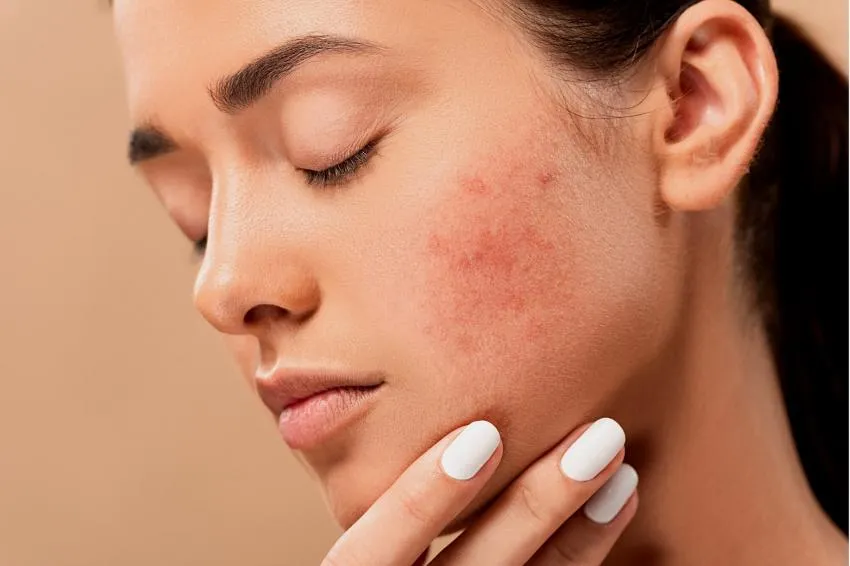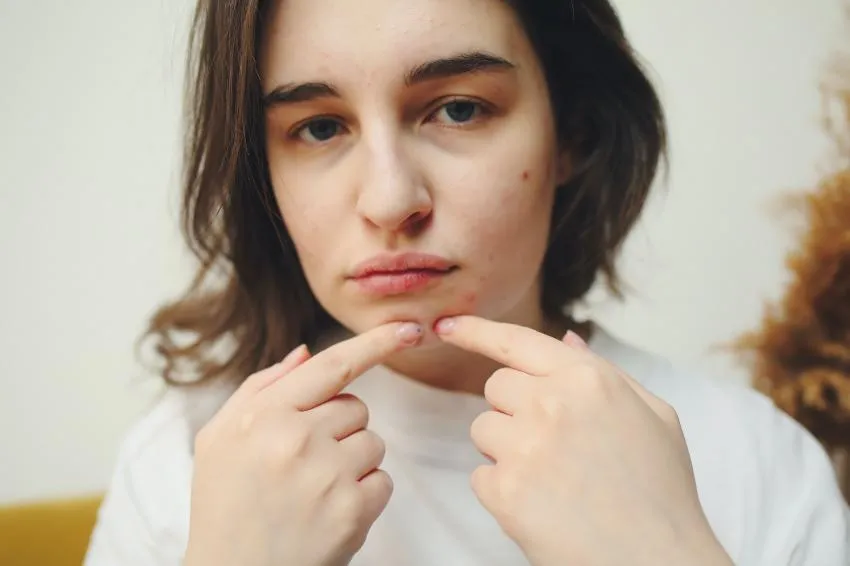8 Ingredients To Include In Your Skincare Routine To Soothe Rosacea

People suffering from rosacea are often unaware of its existence because it is very easy to mix up the symptoms with similar skin conditions. This can end up leaving you confused and unable to treat the symptoms.
If you have been suffering from the irritating redness and sensitivity caused by rosacea and can't figure out a way to get rid of it, you might want to take a look at the skincare products you've been using.
Harsh ingredients in skincare can often worsen rosacea and cause flare-ups. It's important to keep an eye out for these ingredients in order to avoid them and instead include gentle ingredients in your skincare that will target all the different symptoms of rosacea and help reduce them over time.
What is rosacea?
Often mistaken for acne, eczema, and similar skin conditions, rosacea is a chronic inflammatory skin condition that affects more than 14 million people. Although Rosacea is more common among women above the age of 30, it can affect anyone.
Rosacea is a common skin disease that usually begins with redness of the nose, cheeks, forehead or chin along with small, red, pus-filled bumps on the skin that are present during flare-ups.
People with rosacea experience flare-ups that take place in cycles where they experience symptoms for a few weeks after which their symptoms subside, only to come back in some time.
There is currently no known definitive cause of rosacea, however, consumption of certain foods and beverages like alcohol, dairy products, and spicy foods can worsen the symptoms.
Types of rosacea
According to the American Academy of Dermatology, the following are the four types of rosacea:
- Erythematotelangiectatic rosacea: Symptoms include skin discoloration, stinging and burning skin, swollen skin, flushing, and visible blood vessels.
- Papulopustular rosacea: Symptoms include sensitive skin, oily skin, flushing, swelling, and breakouts that resemble acne.
- Phymatous rosacea: Symptoms include large pores and thickened, bumpy skin on chin, cheeks, forehead, and ears.
- Ocular rosacea: Symptoms include eye redness, dry eyes, eye sensitivity and irritation, and swollen eyelids.
Common symptoms of rosacea

- Redness or flushing
- Visible blood vessels
- Acne-like breakouts
- Dry and red eyes
- Swelling of skin
- Skin sensitivity
- Scaly skin
- Thickened skin
Skincare Ingredients that help soothe rosacea

Although there is no cure for rosacea, the symptoms can be controlled and avoided by using the right skincare products. Here are the skincare ingredients that help soothe rosacea:
1. Azelaic Acid
Azelaic acid is in a class of medications called dicarboxylic acids. It can help reduce the redness, swelling, and inflammation caused by rosacea and consequently help control any acne breakouts.
The 15% gel formulation of azelaic acid is FDA approved to help treat mild to moderate rosacea.
2. Zinc or Titanium Dioxide
Zinc and titanium dioxide are essential ingredients in any good sunscreen. Since rosacea can be triggered by sun exposure, the use of a good sunscreen is absolutely essential for anyone with rosacea.
It’s important to find sunscreen with sufficient UV protection and rosacea-friendly ingredients that aren’t harsh on your skin.
3. Hyaluronic acid
Rosacea can cause dryness of skin as a result of impaired moisture barrier functions. Hyaluronic acid helps cells retain moisture, making it the perfect ingredient to look for in a moisturizer.
4. Niacinamide
If you have rosacea, you might’ve noticed that your pores appear enlarged. Niacinamide minimizes the appearance of pores and helps reduce redness caused by inflammation.
5. Metronidazole
Metronidazole works best for anyone with acne rosacea as it may help to decrease redness, swelling, and the number of pimples caused by rosacea.
Metronidazole works by stopping events leading to inflammation that may smolder without papules or pustules in untreated patients
6. Squalane
Squalane is naturally present in the skin’s lipid barrier and helps prevent moisture loss. It is a gentle ingredient that can be found in multiple skin care products with simple formulas.
According to research, squalane has anti-inflammatory properties that can reduce redness and swelling.
7. Retinol
Although retinol can help reduce the appearance of pus-filled or red bumps, sometimes it can make skin redness worse. Thus, it must be used carefully for a short period of time to see if it works for your skin.
8. Vitamin C
The inclusion of vitamin C in your skincare routine can exponentially help reduce the redness caused by rosacea because vitamin C helps strengthen capillaries which will lead to fewer broken capillaries.
For oily or normal skin, L-ascorbic acid is the most potent form of vitamin C and can be the most beneficial, while for dry and sensitive skin, magnesium ascorbyl phosphate, a water-soluble vitamin C, is less irritating.
The perfect skincare routine for rosacea

Now that you know what ingredients to look for in your skincare products to soothe rosacea, you might be wondering how to include them in your skincare routine.
For anyone with rosacea, a very gentle skincare routine is a must and any harsh and complicated skincare products or routines can end doing a lot of harm.
So remember to stick to a simple skincare routine that includes gentle products.
Start with a gentle and hydrating cleanser followed by exfoliation with a BHA like salicylic acid instead of an AHA like glycolic acid because it’s less irritating and can help minimize the appearance of enlarged pores.
Moisturization is essential because rosacea can cause dryness of skin and thus creams and lotions with ceramides, glycerin and hyaluronic acid can be beneficial.
Sun protection is crucial because UV light and heat can contribute to and trigger rosacea flares which is why you should never leave the house without putting on an SPF 30 or higher sunscreen.
Skincare Ingredients to avoid if you have rosacea
Rosacea makes the skin more sensitive and thus the use of products with the following ingredients can cause skin irritation and worsen the symptoms of rosacea.
- Alcohol
- Camphor
- Glycolic acid
- Lactic acid
- Menthol
- Urea
- Witch hazel
- Menthol
- Peppermint
- Eucalyptus oil
- Fragrances
- Propylene glycol
Having rosacea can be irritating for both, the skin and the person dealing with it but fortunately, all the symptoms of rosacea can easily be controlled by the inclusion of these ingredients in your skincare routine.
So don't fret and worry about the stubborn redness and acne that often accompanies rosacea and consult your dermatologist to find a skincare routine that will be perfect for your skin depending on the type of rosacea you have.
With time you'll find out what works for your skin and what doesn't and you'll discover skincare products that will soon become your holy grail.
Opinions and Perspectives
I've struggled with rosacea for years and found azelaic acid to be a game changer. Started with 10% concentration and slowly worked my way up.
Really informative article. Never knew there were 4 different types of rosacea. I always thought mine was acne until my dermatologist diagnosed it properly.
Anyone tried squalane? My skin gets so dry and sensitive, wondering if it's worth giving it a shot.
Squalane has been amazing for my skin! I use it at night and wake up with much calmer, less irritated skin. Just make sure to patch test first.
The list of ingredients to avoid is super helpful. I was using witch hazel thinking it would help with redness, but now I understand why my skin kept getting worse.
Interesting point about retinol. My dermatologist actually advised against using it because my rosacea is quite severe.
I've had great success combining niacinamide and azelaic acid. The redness has reduced significantly over the past few months.
This article mentions UV protection but doesn't emphasize enough how crucial it is. Sun exposure is my biggest trigger.
Has anyone tried vitamin C? I'm nervous about adding new ingredients to my routine.
Metronidazole cream was prescribed by my doctor and it works wonders for the pustules, but doesn't do much for the overall redness.
Thank you for breaking down the different forms of vitamin C. I didn't know about magnesium ascorbyl phosphate being gentler.




